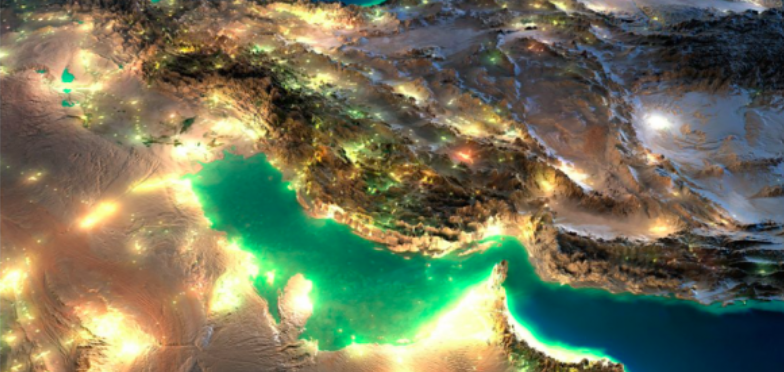The Middle East Directions Programme’s Regional Security Initiative endeavors to rethink security system in the Persian Gulf region. Saudi Arabia, United Arab Emirates, Kuwait, Qatar, Bahrain, Oman, and Iran are experiencing significant shifts at societal, state, and international levels, while systemic dysfunctionalities in the Gulf security systems continue to feed perceptions of insecurity and create fault lines. US-Iran tensions, Saudi-Iranian rivalry, and the intra-GCC rifts are all examples of tensions, which, if left unchecked, carry risks of wide-reaching repercussions within the region and beyond.
In the current environment, regional and global actors’ privilege risk-taking behavior that can be seen as potentially more rewarding. Previous approaches in addressing this pattern in the Persian Gulf sub-complex, including ambitious comprehensive approaches to rebuild regional security architecture, seem to have had limited success or have failed. Current dynamics make it very difficult for international actors to convene, incentivize, or forcefully push all the competing players to cooperate.
Rethinking regional security in the Persian Gulf requires a more in-depth analysis of the systemic causes of insecurity. Researches on the trends and dynamics that produce and perpetuate inter-state tensions need to be performed. These findings have to be better incorporated in policy options to build a compelling political rationale for reconciliation and rethinking the role the EU and other key international and regional actors.
New ideas are required to design tailor-made incremental steps to promote de-escalation and address the security dilemmas of all stakeholders. It requires lessons be learned from both failures and successes, including thorough comparative study of other regions.
Activities
Against this background, the Regional Security Initiative has the ambition to become a platform for research and a laboratory of ideas on fostering engagement between stakeholders and promoting gradual de-escalation and regional cooperation.
The Regional Security Initiative will use non-traditional security (NTS) factors and non-conventional diplomacy (NCD) tools – both short-term and long-term – to promote cooperation between state and non-state stakeholders. It will focus on the role of international and regional players from Saudi Arabia, Iran, Turkey, Israel, the United Arab Emirates, Oman, Iraq, EU, Russia, the United States, and China to influence regional security architecture.
Research objectives
1. Advance knowledge on International relations of the Gulf region. That includes identifying the role of complex threat perceptions and non-traditional security factors in a regional security building.
2. Promote and broaden research and analysis of the systemic causes of insecurity in the Persian Gulf security system.
3. Produce policy-relevant studies on de-escalation and regional cooperation.
4. Organize workshops and support discussion among actors.
5. Support EU’s policies in the region through critical and innovative policy analysis
The Regional Security Initiative publishes policy briefs, research papers, and ebooks and contributes to the MEDirections blog. It also organizes monthly roundtables and closed-door meetings.
The Team
The initiative is headed by Luigi Narbone and Abdolrasool Divsallar, with both having extensive experience in diplomacy and military-security dynamics of the region. Clément Therme and Cyril Widdershoven are Associates to the initiative.
I
E-BOOKS
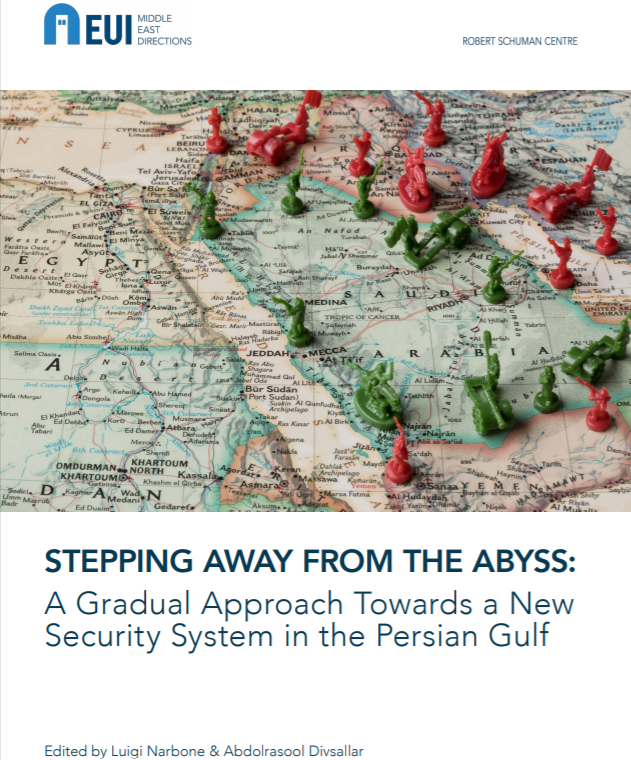
What are the key drivers of the current regional insecurity? What options are there to respond to the unfolding crisis and why have previous efforts to create an effective regional security architecture failed? How can a new regional security-building approach emerge?
The eBook proposes a security building continuum approach made of gradual, informal and incremental steps and incorporating non-traditional security instruments as a pathway toward achieving long-term sustainable security in the region.
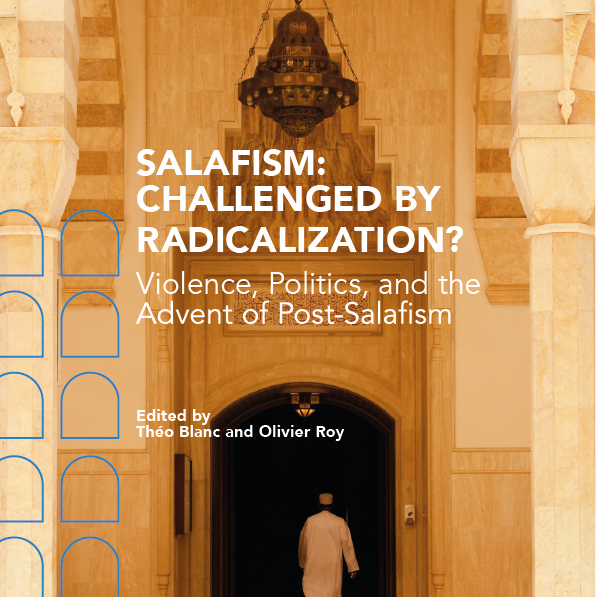
ANNUAL CONFERENCE
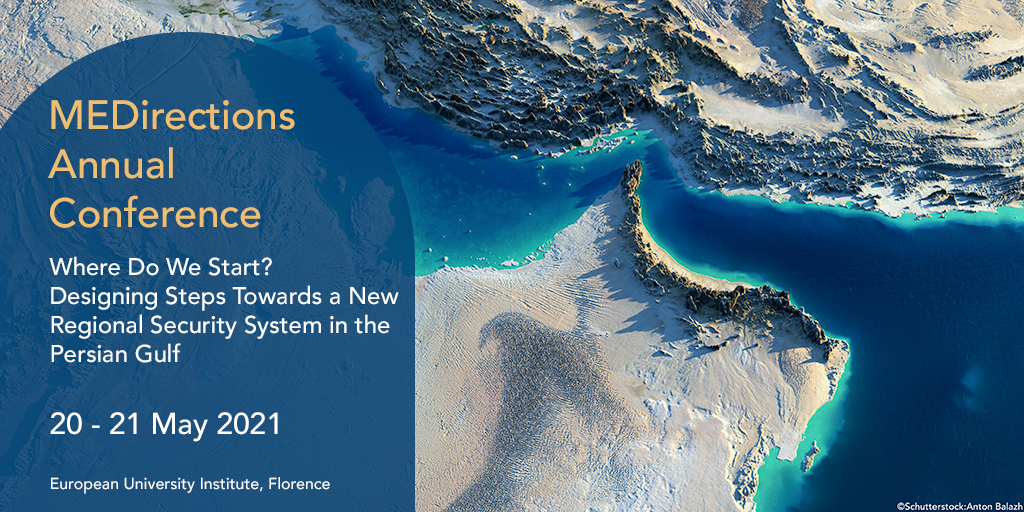
The 2021 Annual Conference provided an opportunity to discuss the findings in the e-book Stepping away from the Abyss: Step-by-step toward a New Security system in the Persian Gulf. It was the first major event organised in the framework of the MEDirections new Regional Security Initiative, bringing together scholars, researchers, practitioners, policymakers and a distinguished group of international experts to discuss options to design a collective security system in the Persian Gulf region. It provided a platform for critical analysis of theoretical frameworks and practical options with a multi-disciplinary approach.
LEARN MORE on our Annual Conference
PODCAST
PHOTO-GALLERY
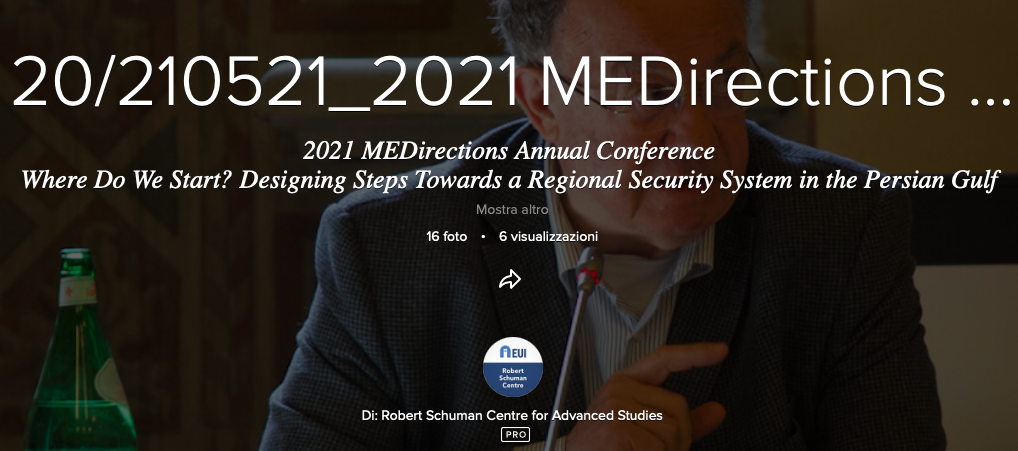
RESEARCH PUBLICATIONS
Research Project Report | Shifting Threats and Strategic Adjustment in Iran’s Foreign Policy: The case of Strait of Hormuz by Abdolrasool Divsallar (September 2021)
Research Project Report | The Red Sea link : geo-economic projections, shifting alliances, and the threats to maritime trade flows by Luigi Narbone, Cyril Widdershoven (August 2021)
Policy Brief | Can Europe Choreograph a Saudi-Iranian Détente? by Cinzia Bianco (March 2021)
Research Project Report | The Fallout of the US-Iran COnfrontation for Russia: Revisiting Moscow Calculus by Abdolrasool Divsallar, Pyotr Kortunov (December 2020)
Policy Brief | The popular mobilisation units as a relief agency: can the Coronavirus pandemic accelerate institutional transformation? by Tamer Badawi (June 2020)
Policy Brief | De-escalating the Iran crisis: is there a role for Europe? by Abdolrasool Divsallar (February 2020)
Policy Brief | A US-Iran zero-sum game on Covid-19 could threaten global health security by Abdolrasool Divsallar, Luigi Narbone (April 2020)
Policy Brief | What prospects for stabilisation and reconstruction in the Middle East and North Africa? by Luigi Narbone (March 2019)
BLOGS
Confidence building to avoid military clashes in the Persian Gulf (5 March 2021) by MEDirections
US election 2020: towards a shift in US-Iran relations and a new Middle East regional order? / Part 1 (8 January 2021) and Part 2 (14 January 2021) by MEDirections
GCC Economies Struggle with Post-COVID Options, with Instability on the Horizon by Cyril Widdershoven (11 December 2020)
Will Iran benefit from the assassination of Fakhrizadeh by Abdolrasool Divsalar (4 December 2020)
Universities as vehicles of regional de-escalation: Unpackaging the potential of cultural diplomacy by Michael Stopford (30 November 2020)
The political dimension of the Covid19 epidemic in the Middle East by Olivier Roy (4 May 2020)
The Russia-Saudi oil price war: How it could end? by Cyril Widershoven (17 April 2020)
Iran’s More Offensive Security Policy in the Post-Protest Period by Abdolrasool Divsallar (9 December 2019)
De-escalating Tension in the Gulf: Why Efforts to Facilitate Arab-Iranian Dialogue should be Intensified by Tamer Badawi and Luigi Narbone (5 June 2019)
EVENTS
Webinar | The Future of Iran – Gulf Cooperation Countries Relations: Saudi Perspectives (31 May 2021)
Webinar | Engaging Iran. European and Transatlantic Perspectives on the JCPOA and Security in the Gulf (06 May 2021) | The event is part of the Rome MED 2021 initiatives and it is held in partnership with the European University Institute on the occasion of the State of the Union 2021) WATCH THE EVENT HERE.
Roundtable | Managing the Risk of a Military Collision in the Persian Gulf: From Where to Start? (02 February 2021)
Roundtable | US elections 2020: towards a shift in the US-Iran relations and a new Middle East regional order? (14 December 2020)
Roundtable | How has the pandemic affected conflict dynamics in Syria and Libya? How has it impacted the tensions between Iran and the Gulf? (29 June 2020)
Roundtable | An Iranian Perspective on the Kurdish Crisis: Implications and future directions (5 November 2019)
Roundtable | From Political Engagement to Political Demonisation: US-Iran Policy 2013-2019 (4 June 2019)
Roundtable | The Politics of Religious Reforms in MBS’s Saudi Arabia (30 April 2019)
Lecture | Iran’s Cognitive Context of Strategic Thinking (9 April 2019)
MULTIMEDIA
I



